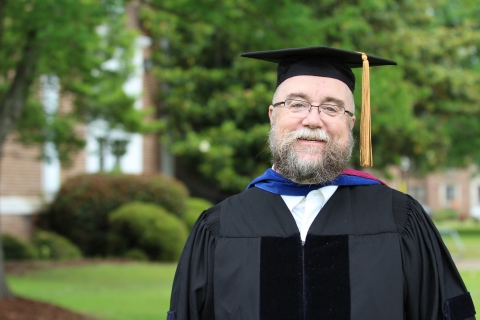After career of serious research and teaching, historian looking forward to peaceful pursuits

Story: Phillip Tutor | Photo: Betsy Compton
The hints inside Dr. Richard Schellhammer’s crowded campus office aren’t subtle. They reveal personal secrets: who he is, what he adores, how he fills his days. History books bloat his bookshelves. Framed trinkets of his academic expertise — pre-World War I Germany — hang near the desk. He’s a native Pennsylvanian, so a black Pittsburgh Steelers jersey dominates one wall.
If anything, the chair of the University of West Alabama’s Department of History and Social Sciences and interim dean of the College of Liberal Arts is a man of serious pursuits.
Now, after nearly three decades at UWA, the retiring Schellhammer was recently awarded the title of Professor Emeritus, a distinction that honors his professional accomplishments and the campus leadership he’s provided.
His last day at UWA is Aug. 1.
“It’s an honor to be named,” Schellhammer, 62, said. “It just means you’ve done a good job. That, to me, means you’ve been a good teacher and a good colleague, and the university appreciates the work you’ve done. It’s a good end to a career.”
But to trace his career’s beginnings requires a trip back to his home state, where he was raised not far from Pittsburgh. When he was an 11th-grader, Schellhammer’s family migrated north to Bradford, Pennsylvania, a small city about 75 miles from Buffalo, New York. (Bradford’s twin claims to fame, which Schellhammer easily recites, are Case cutlery and Zippo lighters.) He then enrolled at Penn State University, where he earned his bachelor’s of arts degree in history in 1984.
Graduate school took him to the Midwest, where he unexpectedly “got into the moonshot, I got into (the University of) Chicago, a top-five program in the country” for his master’s degree, and then to the University of South Carolina for his Ph.D. A delay in applying to USC returned him to State College, Pennsylvania, where for a year he drove a cab, delivered furniture and learned that college students often lack the best tipping habits.
“Liberal arts degrees prepare you in general. Liberal arts degrees prepare you to do what any kind of employer wants. I’m a teacher, and I use history to teach my students how to construct a logical argument and present the facts rationally.”
— Dr. Richard Schellhammer
He left USC with a doctoral degree, teaching experience at that university, the College of Charleston (where he drove 242 miles, roundtrip, twice a week for class) and Newberry College, and a dissertation focusing on the comparative labor history of cutlery workers in Solingen, Germany, and Sheffield, England.
A faculty opening at UWA and personal connections in higher education brought him in January 1994 to Alabama’s Black Belt — a long way, in distance and size, from northern Pennsylvania and Chicago’s South Side.
Once on campus, he rose in rank and responsibility with each turn of the calendar. A commonly held trait among UWA faculty is the ability to succeed while wearing multiple hats. Schellhammer embodies that trend, given that he’s a professor, a department chair, his college’s interim dean, and has served on the UWA faculty senate. He also serves on the Alabama State Holocaust Commission.
The weightiness of that schedule may be why UWA’s most recent Professor Emeritus already knows what he plans to do with his free time.
“I plan to go walking in the woods every day,” he said.
Preaching the value of liberal arts
That mental escape doesn’t mean Schellhammer’s adoration of his profession has waned. He discusses the enjoyment he gets from teaching with the same convincing tone he uses when explaining his research into early British films or the meaning of the first World War. (It’s modernism, he says.)
“I think if you’re going to teach, you have to look at it as a vocation,” he said. “I mean that in more of a religious sense, that you have to look at it as something to make the world better. You have to enjoy the interaction with the kids and try to show them what they’re capable of doing. You’re fulfilling literally your God-given role, and you should take those talents you’ve got. You can’t make somebody a good teacher. You either are or you’re not.”
Given that Schellhammer is a department chair and interim dean, a holistic appreciation of liberal arts is baked into his outlook. Ask him why students today should study the humanities and he remains steadfast. “I tell my students all the time that every single study that’s ever been done on this shows that, within reason, money doesn’t make up for a job you hate,” he said. “Why should you major in history? Because you love it.”
He then asks and answers his own question — with a question. “What can you do with a history degree? What do you want to do with it?”
His point hinges on versatility and nimbleness — in life, in knowledge, in the workforce. “Liberal arts degrees prepare you in general. Liberal arts degrees prepare you to do what any kind of employer wants. I’m a teacher, and I use history to teach my students how to construct a logical argument and present the facts rationally.”
His departure nearing, Schellhammer is eager to hop behind the wheel of the retirement gift he bought for himself — a silver 1986 Alfa Romeo Spider that’s still impressive despite its odometer’s 124,000 miles and a few mechanical headaches. He’s also looking forward to those walks along forested trails that remind him of his childhood in Pennsylvania. He and his wife fancy a new home, perhaps one high in the Appalachian mountains, where those walks could become daily routines.
“It’s really peaceful and calm,” he said. “It makes me feel good.”